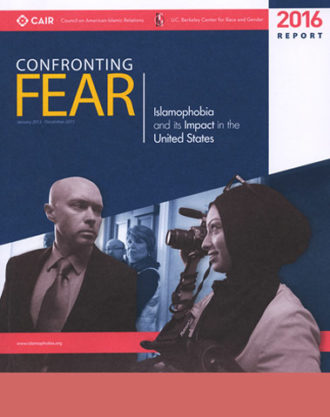Introduction
A Message from the Council on American-Islamic Relations
Islamophobia has unfortunately moved from the fringes of American society to the mainstream.
Viable contenders for the office of the presidency have suggested un-constitutional policies such as banning all Muslims from the United States or suggesting that a Muslims could not be president of the United States. Elected officials in 10 states have enacted legislation designed to vilify or otherwise target Islam. In at least two states, the way school text books are selected was changed because some activists wrongly believe that introductory religious courses that teach children Islam’s five pillars are “indoctrination” and “proselytization.” Islamophobic groups have enjoyed access to at least $205 million to spread fear and hatred of Muslims.
The last two months of 2015 saw 34 incidents in which mosques were targeted by vandals or those who want to intimidate worshippers. This is more incidents than we usually record in an entire year.
This report makes a case that those who value constitutional ideals like equal protection, freedom of worship, or an absence of religious tests for those seeking public office no longer have the luxury of just opposing the U.S. Islamophobia network’s biased messaging.
The strategy outlined in this report is an evolution from the opposition-centric strategy CAIR’s Department to Monitor and Combat Islamophobia has pursued since we published Legislating Fear in 2012.
The proposed strategy focuses instead on changing the environment. Islamophobia and groups that promote bias will likely always exist, but the current environment that grants anti-Islam prejudice social acceptability must change so that such bias is in the same social dustbin as white supremacism and anti-Semitism.
I would like to thank Corey Saylor for leading the effort on this report. I would also like to thank the many people—see the acknowledgements section of this report— who gave their time and talent to help craft the strategy we are proposing.
In peace,
Nihad Awad
Executive Director
Read Publication